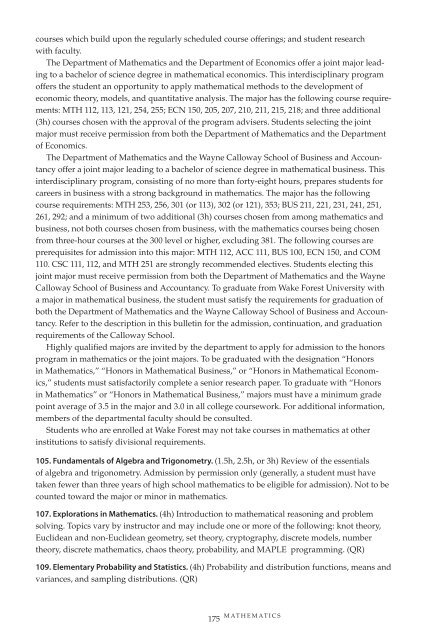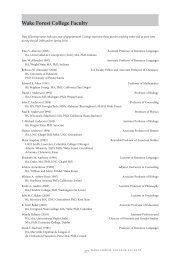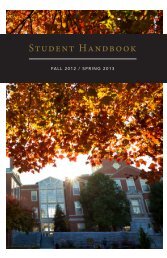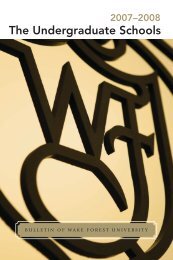theundergraduateschoo ls - Wake Forest University
theundergraduateschoo ls - Wake Forest University
theundergraduateschoo ls - Wake Forest University
Create successful ePaper yourself
Turn your PDF publications into a flip-book with our unique Google optimized e-Paper software.
courses which build upon the regularly scheduled course offerings; and student research<br />
with faculty.<br />
The Department of Mathematics and the Department of Economics offer a joint major leading<br />
to a bachelor of science degree in mathematical economics. This interdisciplinary program<br />
offers the student an opportunity to apply mathematical methods to the development of<br />
economic theory, mode<strong>ls</strong>, and quantitative analysis. The major has the following course requirements:<br />
MTH 112, 113, 121, 254, 255; ECN 150, 205, 207, 210, 211, 215, 218; and three additional<br />
(3h) courses chosen with the approval of the program advisers. Students selecting the joint<br />
major must receive permission from both the Department of Mathematics and the Department<br />
of Economics.<br />
The Department of Mathematics and the Wayne Calloway School of Business and Accountancy<br />
offer a joint major leading to a bachelor of science degree in mathematical business. This<br />
interdisciplinary program, consisting of no more than forty-eight hours, prepares students for<br />
careers in business with a strong background in mathematics. The major has the following<br />
course requirements: MTH 253, 256, 301 (or 113), 302 (or 121), 353; BUS 211, 221, 231, 241, 251,<br />
261, 292; and a minimum of two additional (3h) courses chosen from among mathematics and<br />
business, not both courses chosen from business, with the mathematics courses being chosen<br />
from three-hour courses at the 300 level or higher, excluding 381. The following courses are<br />
prerequisites for admission into this major: MTH 112, ACC 111, BUS 100, ECN 150, and COM<br />
110. CSC 111, 112, and MTH 251 are strongly recommended electives. Students electing this<br />
joint major must receive permission from both the Department of Mathematics and the Wayne<br />
Calloway School of Business and Accountancy. To graduate from <strong>Wake</strong> <strong>Forest</strong> <strong>University</strong> with<br />
a major in mathematical business, the student must satisfy the requirements for graduation of<br />
both the Department of Mathematics and the Wayne Calloway School of Business and Accountancy.<br />
Refer to the description in this bulletin for the admission, continuation, and graduation<br />
requirements of the Calloway School.<br />
Highly qualified majors are invited by the department to apply for admission to the honors<br />
program in mathematics or the joint majors. To be graduated with the designation “Honors<br />
in Mathematics,” “Honors in Mathematical Business,” or “Honors in Mathematical Economics,”<br />
students must satisfactorily complete a senior research paper. To graduate with “Honors<br />
in Mathematics” or “Honors in Mathematical Business,” majors must have a minimum grade<br />
point average of 3.5 in the major and 3.0 in all college coursework. For additional information,<br />
members of the departmental faculty should be consulted.<br />
Students who are enrolled at <strong>Wake</strong> <strong>Forest</strong> may not take courses in mathematics at other<br />
institutions to satisfy divisional requirements.<br />
105. Fundamenta<strong>ls</strong> of Algebra and Trigonometry. (1.5h, 2.5h, or 3h) Review of the essentia<strong>ls</strong><br />
of algebra and trigonometry. Admission by permission only (generally, a student must have<br />
taken fewer than three years of high school mathematics to be eligible for admission). Not to be<br />
counted toward the major or minor in mathematics.<br />
107. Explorations in Mathematics. (4h) Introduction to mathematical reasoning and problem<br />
solving. Topics vary by instructor and may include one or more of the following: knot theory,<br />
Euclidean and non-Euclidean geometry, set theory, cryptography, discrete mode<strong>ls</strong>, number<br />
theory, discrete mathematics, chaos theory, probability, and MAPLE programming. (QR)<br />
109. Elementary Probability and Statistics. (4h) Probability and distribution functions, means and<br />
variances, and sampling distributions. (QR)<br />
M A T H E M A T I C S<br />
175






